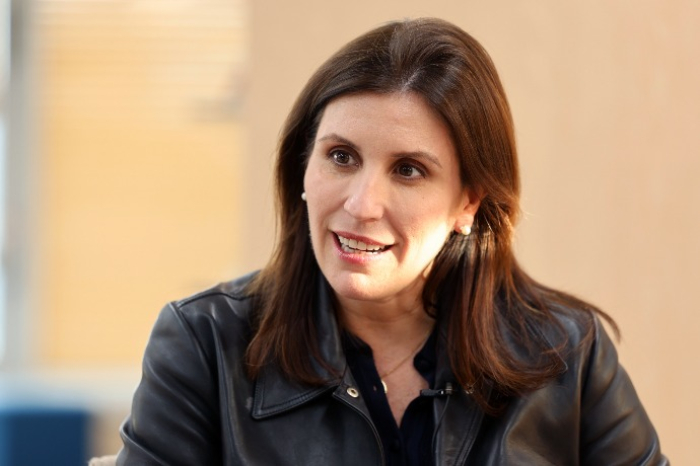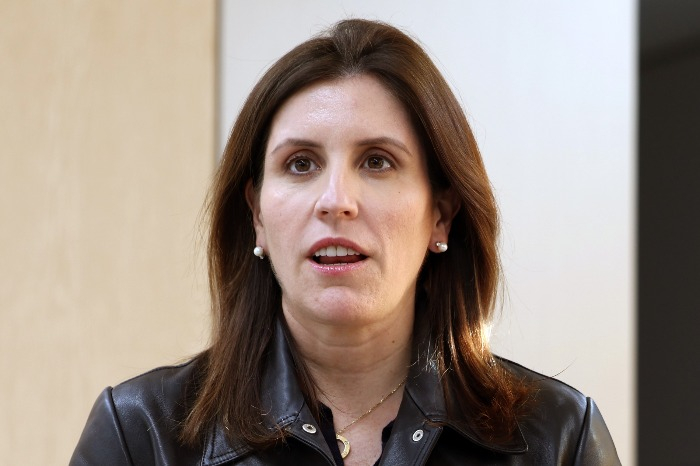Stay liquid, be selective, look outside US tech, says TCW CEO
She advises focusing on companies well-positioned to benefit from energy transformation and supply chain disruptions
By Apr 08, 2025 (Gmt+09:00)
LG Chem to sell water filter business to Glenwood PE for $692 million


KT&G eyes overseas M&A after rejecting activist fund's offer


Kyobo Life poised to buy Japan’s SBI Group-owned savings bank


StockX in merger talks with Naver’s online reseller Kream


Meritz backs half of ex-manager’s $210 mn hedge fund



Global financial markets are facing rising volatility and uncertainty this year as the US stock market rally led by Big Tech is losing steam amid concerns over high valuations and a slowing economy, said Katie Koch, chief executive of TCW.
The Los Angeles-based asset manager views current valuations in both equity and credit markets as "very demanding" and has advised investors to wait until valuations adjust.
"It’s a tough environment to make long-term investment decisions when you’re not exactly sure of the trajectory of the policy environment and also of growth,” Koch told The Korea Economic Daily in a recent interview.
“You have to be selective at the security level. Keep you liquid and conservatively positioned … We think the market could be cheaper and we want to be able to take advantage of that for clients,” she added.
The former public equity head at Goldman Sachs Asset Management recommends investors look outside top US tech companies and stock indices, which have been concentrated on a small group of tech stocks.
Koch advised focusing on companies well-positioned to benefit from the energy transformation and supply chain disruptions, as well as smaller companies beyond large-caps.
Energy demand is rising to power AI data centers, while the US government's tariff policy aimed at reshoring manufacturing could disrupt global supply chains.
EUROPE, EMERGING MARKETS
Europe would also be a good destination for investors. She noted that the rise in Europe's capital expenditures on domestic facilities could offer good investment opportunities, citing Germany's rising defense spending.
“Europe has been very overlooked. Some emerging markets too: cheap valuations and highly diversified from what’s happening in the US," said the CEO.
TCW manages $200 billion in assets, specializing in private credit and fixed income with a focus on the middle market, or companies with $25 million-$100 million of EBITDA.
Koch took over as CEO of TCW in February 2023 after a 20-year stint at Goldman Sachs.
SLOWDOWN IN CONSUMER SPENDING
Koch warned that the hype surrounding AI has been fully priced in and AI-themed stocks will likely underperform in the short term.
“There are many decades to go in this theme … but there are some questions around demand for some of those companies on the back of cheaper alternatives to AI coming out of Asia and that puts some downward pressure on those companies.”
There's been a slowdown in discretionary spending in the US, the first such trend since COVID-19 instilled a lot of caution. The spending weakness could last longer than that during the COVID period, she said.
“Consumers have already demonstrated recessionary behaviors across many sectors. In the top end of the (consumer) market, we are starting to see weakness. It is giving us a lot of caution.”
More than 70% of the US GDP is driven by consumption, which may remain sluggish due to inflation concerns.
She said the Fed is going to prioritize containing inflationary pressure and keep rates higher for longer. The CEO sees the Trump administration's high tariff policy as causing a one-time reset in prices, rather than continuously putting upward pressure on prices.

‘VERY TIGHT’ SPREADS
TCW is overweight on agency loans, such as mortgage asset-backed securities and secured loans. It is underweight on corporate credit, which Koch said is very expensive, citing tight spreads between government and corporate bond yields.
“We think that this volatility will eventually cause spreads to widen and there will be a better opportunity to own more credit. So, the environment is weakening, valuations haven’t adjusted yet.”
MIDDLE MARKET
Private credit has become a mainstream asset class for Korean alternative investors. As they seek diversification within their private credit portfolios, Koch recommended going further down to the middle market space.
“It’s a much less crowded place to invest in (than the upper market). That’s what we focus on at TCW. We’re focused on companies between $25 million and $100 million of EBITDA," she noted.
To manage the risks in the middle market, she advised strong loan documentation, or “very strong covenants,” prioritizing the discipline of capital over its deployment.
Write to Yeonhee Kim and Suji Na at yhkim@hankyung.com
Jennifer Nicholson-Breen edited this article.
-
 Asset managementStrong momentum in non-US markets, digital real estate: Principal AM CEO
Asset managementStrong momentum in non-US markets, digital real estate: Principal AM CEOApr 02, 2025 (Gmt+09:00)
long read -
 Alternative investmentsKIC explores Europe middle-market private equity opportunities
Alternative investmentsKIC explores Europe middle-market private equity opportunitiesFeb 25, 2025 (Gmt+09:00)
1 Min read -
 ASK 2024Private debt remains attractive; NPLs rekindle interest
ASK 2024Private debt remains attractive; NPLs rekindle interestOct 17, 2024 (Gmt+09:00)
2 Min read -
 Private debtValue in the middle market: Smaller size means greater potential
Private debtValue in the middle market: Smaller size means greater potentialJun 18, 2024 (Gmt+09:00)
7 Min read -
 Asset managementKorean investors turn to private credit, secondaries: CIOs
Asset managementKorean investors turn to private credit, secondaries: CIOsMay 22, 2024 (Gmt+09:00)
3 Min read -
 Private debtM&A rebound will drive private credit volume increase: Golub Capital
Private debtM&A rebound will drive private credit volume increase: Golub CapitalMay 16, 2024 (Gmt+09:00)
3 Min read -
 Asset managementFed rate cuts will be faster than market consensus: TCW
Asset managementFed rate cuts will be faster than market consensus: TCWApr 02, 2024 (Gmt+09:00)
3 Min read -
 Asset Owners ReportPrivate debt, infrastructure remain top picks for Korean LPs in 2024
Asset Owners ReportPrivate debt, infrastructure remain top picks for Korean LPs in 2024Jan 29, 2024 (Gmt+09:00)
6 Min read -
 Private debtKorean LPs stick to private debt amid market uncertainties
Private debtKorean LPs stick to private debt amid market uncertaintiesFeb 01, 2024 (Gmt+09:00)
3 Min read -

-
 Asset managementUS non-agency mortgage-backed securities to shine in 2023: TCW
Asset managementUS non-agency mortgage-backed securities to shine in 2023: TCWDec 22, 2022 (Gmt+09:00)
long read -
 Private debtInvestors may see tough credit cycle in direct lending: TCW Private Credit
Private debtInvestors may see tough credit cycle in direct lending: TCW Private CreditJul 06, 2022 (Gmt+09:00)
long read


